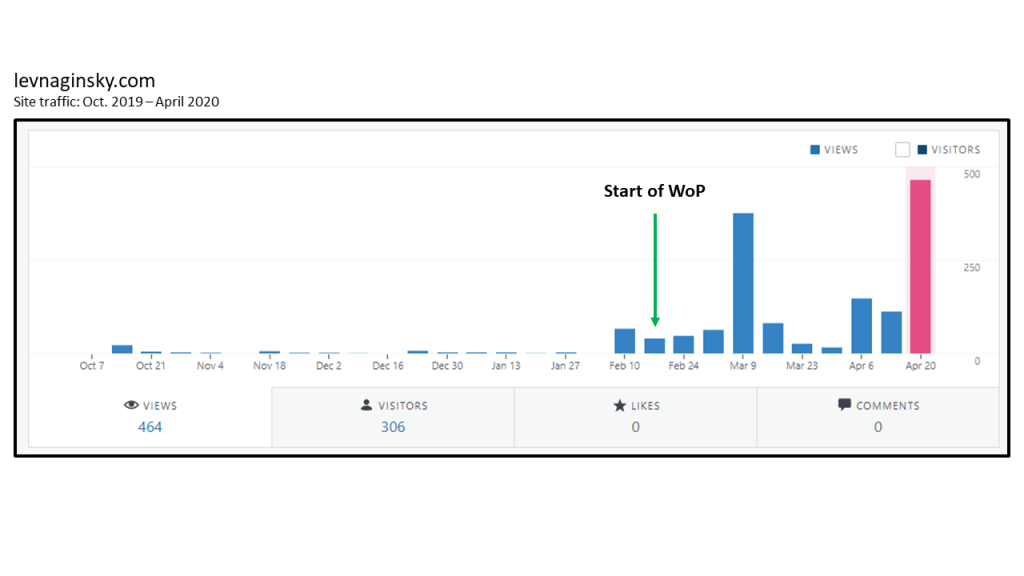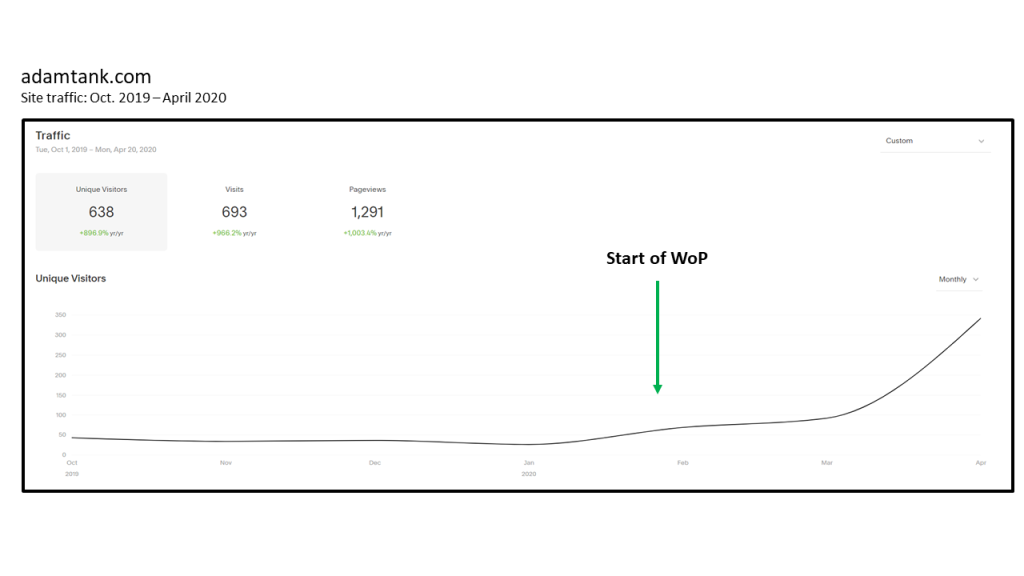Reflections from five weeks in an online writing course
You probably already write. You may have a journal, an old blog, or a semi-active Twitter account. But you’ve always wanted to do more. You follow authors and writers that inspire you. You want to publish consistently. You want to write more compelling pieces. You want to have a newsletter that people actively engage with. But you never really knew how – or where – to start.
If this resonates with you, you’re not alone. Adam Tank and I shared a similar experience. This article is our attempt to share the most impactful principles and tools we learned from the course and the tangible benefits we’ve seen since the course ended.
How I Settled on Write of Passage
I knew of the course from David Perell. David and I met through Twitter in 2014. Around 2016-17, David’s audience and email subscribers began to skyrocket. He was beginning to build a business that would teach hundreds of students how to write online. In 2019, I thought about ways to accelerate my career. I knew part of that was improving my writing and communication skills, so I naturally turned to David’s writing course for guidance.
The five week Write of Passage course is designed to help students:
- Set up a writing infrastructure (personal website, email newsletter)
- Shift their mindset from a consumer of content to a producer of content.
- Accelerate personal and professional opportunities by writing online.
The course challenges students to take action and develop a repeatable process for generating new ideas, turning them into published pieces of writing, and getting them into the hands of like-minded people.
In fact, Adam and I used the tools we developed during the course to write and distribute the article you’re reading now. More importantly, we used the community of fellow writers (and now friends!) we met to help edit and refine this piece.
Making Friends on the Internet
“Make friends over the internet with people who are great at things you’re interested in. The internet is one of the biggest advantages you have over prior generations. Leverage it.”
Patrick Collison
We are still in the early days of online communities. Establishing meaningful ‘virtual’ relationships is a challenging task when reaching out to like-minded people feels awkward and uncomfortable. But Adam and I realized the smartest people we follow write, share, and discuss their best ideas in public with other virtual connections. It was apparent that future friends, co-authors, or business partners were just a few conversations away.
One of our goals in taking an online course was to tap into a community of writers from all ages, countries, and industries. We discovered that learning in a live online format is fun and the social experience helps students learn faster. Through small feedback groups, relationships begin to form on the internet first, and then later in the real world. Learning and community become one and the same.
Adam and I were placed in the same feedback group at the start of the course. Our small tribe got to know each other personally through critiquing each other’s work and engaging in one-on-one feedback sessions. This made our large class of 200 people seem small.
Joining a community of people committed to writing better, learning faster, and motivating each other sharpened our thinking. We now agree that life is too short to try and learn everything on your own.
This brings us to the first major principle we took away from the online writing course – the importance of accountability.
Principle One: You’re not paying to write. You’re paying to be held accountable to write.
It’s easy to drive yourself to the gym, sit down at the piano to play, or open a notebook and write. Right?
All of these are easy – in theory.
In reality, we find ourselves saying things like,
“I just don’t have the time.”
“I’m too tired.”
“It’s too early.”
Most often, life just gets in the way.
There’s a reason people pay personal trainers $50/hour to help them work out. There’s a reason people pay music teachers 3x/week for 30-minute practice sessions. And there’s a reason people like Adam and I paid $1,000 for a five week writing course.
We paid for accountability and habit formation
The fact is that most of us need a system of accountability to accomplish activities that are mentally and physically challenging.
As it turns out, writing consistently is incredibly challenging. And before Write of Passage, this is the primary reason Adam and I found ourselves writing only when we had the energy–it’s really hard to write consistently when you’re tired, stressed, or just not in the mood.
The class provided us with powerful tools that keep us accountable for writing and publishing consistently every week. Here are a few that have been the most impactful:
Crossfit for Writing
Crossfit is an intense, ‘cult-like’ workout program. People pay $100+/month to complete notoriously difficult exercises in a small group setting. Each class is an hour or less and combines high intensity interval training with things like weight lifting, running, and jump roping.

During Write of Passage, students have the option to meet every Saturday to do Crossfit, but for writing. The goal of the session is to create one piece of written content from scratch in less than two hours. And, if it’s ready, hit publish.
Anyone that has been through one of these sessions knows how exhausting it is. It feels like you just did a grueling workout. But having a system for creating content, receiving feedback, and publishing in under two hours is remarkable.
Adam and I, as well as many others, have continued these weekend Crossfit for Writing sessions since the course ended. What you’re reading right now was written over the course of one of those.
It is the single best accountability mechanism we have to push our classmates to consistently write and publish content each and every week.
Newsletter and personal website
Another tool we created during the course was the infrastructure for a personal website and newsletter. This creates the ‘online home’ for all of your content and a place where people can go to engage with what you’ve written.
One of the best parts about this infrastructure is the awareness of how many people read your content and what they engage with. For Adam and I, this has created a self-sustaining accountability loop where each time we publish, we receive feedback from readers in the form of engagement (likes, follows, emails, newsletter subscribers, etc.) and this engagement encourages us to continue publishing.
This feedback loop has taken us from inconsistent, private writers to prolific, public ones. For example, The Future of Online Education was born out of a Crossfit for Writing session, published a few days later, and led to the most daily visits my website has had to date.
Principle Two: Building a personal Colosseum of written work, brick by brick
One of the easiest ways to showcase thought leadership and authority is to write online. Writing immediately focuses your thinking and compresses ideas to their core.
When we first started the course, every piece of writing felt like an important piece of art. As we wrote and published more, we realized that each piece is NOT a Rembrandt painting, but simply a brick. Slowly, post by post, your body of work starts taking shape and over time, you build an intellectual Colosseum.
“Writing has a wonderful property: if the quality of the things you make is compelling, then the value of the things you make is compounding.”
Justin Mikolay
Traditional writing education strips away peoples’ ability to make their own choices and doesn’t hold them accountable for the words they write. Traditional writing is about not offending anyone.
When you write online, you are responsible for your own writing and thinking. When you share your ideas publicly, and receive instant feedback on those ideas–the quality of those ideas don’t just become interesting, they have the potential to become transformative.
The internet gives people the power to both share and instantly refine their ideas; refining those ideas until they are so sharp that they pierce through mainstream conversations and spread through society like wildfire. Good writing means taking a stand and opening yourself up for critique. In this way, each person that interacts with your content challenges your ideas so they get sharper and stronger over time.
Over time all of your written work becomes a personal ‘Intellectual Colosseum’ that you can point to and say, “This is what I’ve built. This is the proving ground for my ideas.” You can then invite people into your Colosseum to appreciate, reflect upon, or challenge your work.
In practice, this looks very ordinary – tweeting a link to a post you’ve written or sending a short newsletter to your family and friends. But over time, those tweets, posts, and articles add up to a massive body of work that can reach anyone, at any time, forever.
Principle Three: Creating a Serendipity Vehicle to leverage the power of the internet
One of the reasons David Perell encourages people to write online is to create a ‘serendipity vehicle’, a magnet for ideas, people, and opportunities from every corner of the globe.
Our Write of Passage class started on February 19th and ended on March 25th. How are these newly created serendipity vehicles working for us? Here are screenshots of our respective site statistics from October 2019 through April 2020:


Both Adam and I have seen our unique visitors, total visits, and page views grow more than 10x since taking the course. But statistics don’t tell the whole story.
One of the biggest questions Adam had before writing online was how it would impact his professional life (positively or negatively). Writing publicly about embarrassing stories and failures can be a double-edged sword. On one hand, you want to write interesting and compelling content that people can engage with. On the other hand, sharing personal stories and challenges can harm your professional image and credibility.
So far, so good. The personal connections he’s created since building his serendipity vehicle have been nothing short of magical. Here’s one of the many examples of emails he’s received from complete strangers wondering about the future of water:
He has also been surprised to find professional colleagues and clients engaged as well, even on LinkedIn:
But it’s not just Adam. The engagement I’ve received since I started sharing my writing has been beyond my expectations. I wrote a post about my favorite finance blogger, Nick Maggiulli, who reached out to me after I published thanking me for the post:
Austin Rief, co-founder of the newsletter Morning Brew shared my article about the future of education:
This is the power of the internet at work. The is serendipity coming to life. And it’s all because we started writing online.
Was it worth it?
Spending $1,000 on an online writing course was not an easy decision to make; however, when you have that much skin in the game, you feel motivated to stay committed. For us it has proven to be a phenomenal investment that will compound over time. But like anything in life, you get out of it what you put into it.
Those of us serious enough about writing continue to invest in the principles we discussed. We hold Crossfit on Saturdays, write consistently, and keep one another accountable to publish.
To think that Adam and I didn’t know one another just a few months ago seems absurd. The same goes for fellow alumni like Charlie Bleecker, who writes about life’s most intimate topics or Zakk and the digital transformation of large organizations. We even met Juan David Campolargo, a hungry 17-year-old fueled by optimism and countless others.
Hindsight is always 20/20. When I told David that I wished I started writing sooner, his reply was perfect:
Acknowledgements: This post would not be possible without my co-author, Adam Tank. Thanks Zakk, Charlie, and Blair for their feedback.
Note: If you would like to receive future articles by email, subscribe to my Wednesday Wisdom newsletter.

